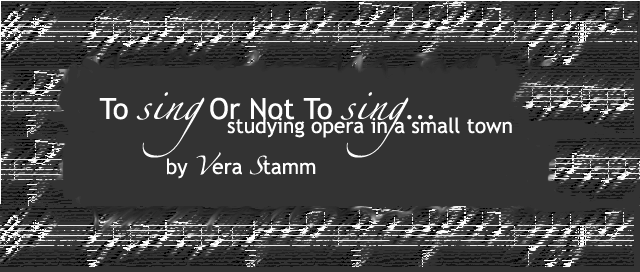

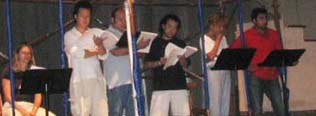
![]() To
many people, opera is a lost art. In America, it is only enjoyed by the
few that can afford to attend operas at the Met on a regular basis and
those who have the time to learn to appreciate it. Most other Americans
think it is boring, most young people just think that it is loud. Nobody
understands the possibility of sitting through an entire opera in another
language. Opera is generally not considered a part of mainstream American
culture, even though some of the best opera houses in the world are within
our country.
To
many people, opera is a lost art. In America, it is only enjoyed by the
few that can afford to attend operas at the Met on a regular basis and
those who have the time to learn to appreciate it. Most other Americans
think it is boring, most young people just think that it is loud. Nobody
understands the possibility of sitting through an entire opera in another
language. Opera is generally not considered a part of mainstream American
culture, even though some of the best opera houses in the world are within
our country.
![]() Italian culture values opera much more than we do. Although the average
person may not enjoy opera much more than most Americans, in Italy opera
is appreciated and considered an important part of the culture. I still
do not believe that many Italian children grow up dreaming of singing
opera, but I do not think that they grow up hating it either.
Italian culture values opera much more than we do. Although the average
person may not enjoy opera much more than most Americans, in Italy opera
is appreciated and considered an important part of the culture. I still
do not believe that many Italian children grow up dreaming of singing
opera, but I do not think that they grow up hating it either.
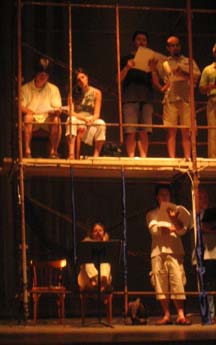
![]() Opera
has always been a strong part of Italian culture and the Italian language
is very important to the art of opera. Around eighty percent of operas
are written in Italian, even when the composer himself is not Italian.
The Italian language is a very suitable for the type of singing that is
involved in opera. Generally Italian is a very flat language with closed
vowels. This allows sound to project very well making it the preferred
language for most composers.
Opera
has always been a strong part of Italian culture and the Italian language
is very important to the art of opera. Around eighty percent of operas
are written in Italian, even when the composer himself is not Italian.
The Italian language is a very suitable for the type of singing that is
involved in opera. Generally Italian is a very flat language with closed
vowels. This allows sound to project very well making it the preferred
language for most composers.
![]() In the United States we have very few specialized private academies for
singing, even fewer for opera singing. Instead "American Idol" scours
the nation for singers with very little talent that can be made famous
for all of five minutes, Italy has schools for singing, and even for opera
singing. In Italian, opera means "work" which is a fitting name based
on the talent and practice that singing opera entails. In American pop
music, aspiring stars can produce multiple CDs without very much vocal
talent.
In the United States we have very few specialized private academies for
singing, even fewer for opera singing. Instead "American Idol" scours
the nation for singers with very little talent that can be made famous
for all of five minutes, Italy has schools for singing, and even for opera
singing. In Italian, opera means "work" which is a fitting name based
on the talent and practice that singing opera entails. In American pop
music, aspiring stars can produce multiple CDs without very much vocal
talent.
![]() It is impossible to get through opera singing in the same way. Not only
is is necessary to have a very beautiful and powerful voice, but one must
also learn to express strong emotion through singing. Singers must study
for many years to come close to perfecting these talents. Despite the
fact that opera is such a strong part of the culture, Italy still has
relatively few schools dedicated to the art. One of the few, and one of
the best is here in Cagli.
It is impossible to get through opera singing in the same way. Not only
is is necessary to have a very beautiful and powerful voice, but one must
also learn to express strong emotion through singing. Singers must study
for many years to come close to perfecting these talents. Despite the
fact that opera is such a strong part of the culture, Italy still has
relatively few schools dedicated to the art. One of the few, and one of
the best is here in Cagli.
![]() These
students come to Cagli at many different stages in their development.
They practice technique, sound, stage direction, all while learning Italian,
since it is the basis of opera. Matteuzzi, a teacher and director at the
school, feels that the best way to make progress in opera is through performing.
Based on this philosophy the school gives the students of all levels a
chance to be on stage.
These
students come to Cagli at many different stages in their development.
They practice technique, sound, stage direction, all while learning Italian,
since it is the basis of opera. Matteuzzi, a teacher and director at the
school, feels that the best way to make progress in opera is through performing.
Based on this philosophy the school gives the students of all levels a
chance to be on stage.
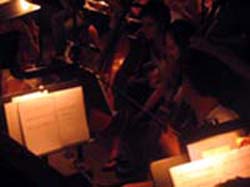
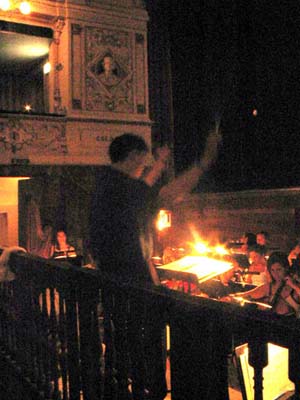
![]() Students train here for two or three years, working all day, every day,
without weekend breaks. Most aspire to sing in Milan or New York at the
Met, the best opera houses in the world. Although they will work very
hard many students will have to realize their limitations and come to
grips with the fact that they may never make it that far. There is room
for less talented singers in the opera world, even at the highest levels,
but only as very minor roles in large productions. Matteuzzi says that
without a strong natural talent for opera, meaning the correct balance
between vocal ability and emotions, no matter how much practice and preparation
a student may go through, they will never reach their goals. Matteuzzi
has the unfortunate role of informing these students about their limitations,
possibly crushing their dreams. But, it is important for them to know
where they are heading, he says, especially before they put in years of
training.
Students train here for two or three years, working all day, every day,
without weekend breaks. Most aspire to sing in Milan or New York at the
Met, the best opera houses in the world. Although they will work very
hard many students will have to realize their limitations and come to
grips with the fact that they may never make it that far. There is room
for less talented singers in the opera world, even at the highest levels,
but only as very minor roles in large productions. Matteuzzi says that
without a strong natural talent for opera, meaning the correct balance
between vocal ability and emotions, no matter how much practice and preparation
a student may go through, they will never reach their goals. Matteuzzi
has the unfortunate role of informing these students about their limitations,
possibly crushing their dreams. But, it is important for them to know
where they are heading, he says, especially before they put in years of
training.
![]() When deciding upon their dreams of opera singing, students must realize
what is ahead of them. Those studying in Cagli will spend two to three
years away from their family and most have come from very far away, including
places such as Mexico, Russia, Yugoslavia, and Korea. The number of different
cultures represented at the school adds a lot to the experience for the
students, especially since they are in such a small town. This makes it
important for them to learn Italian since it is basically their only way
to communicate. Many speak some English, but more not very well.
When deciding upon their dreams of opera singing, students must realize
what is ahead of them. Those studying in Cagli will spend two to three
years away from their family and most have come from very far away, including
places such as Mexico, Russia, Yugoslavia, and Korea. The number of different
cultures represented at the school adds a lot to the experience for the
students, especially since they are in such a small town. This makes it
important for them to learn Italian since it is basically their only way
to communicate. Many speak some English, but more not very well.
![]() These
twenty five students will devote their lives to learning opera during
their time in Cagli. When they leave they will most likely not be ready
to sign on stage professionally. They will spend the next year or so of
their life working with private tutors and entering competitions until
they are finally prepared. Some will then go on to eventually sing the
strongest roles at the strongest opera houses in the world, while others
will spend their careers as understudies and singing minor back up roles
even after all their training. Eventually many, like Matteuzzi will realize
the strain that the lifestyle of an opera singer puts on their private
lives and families and may like him, choose to teach or choose to end
their career early to have a family.
These
twenty five students will devote their lives to learning opera during
their time in Cagli. When they leave they will most likely not be ready
to sign on stage professionally. They will spend the next year or so of
their life working with private tutors and entering competitions until
they are finally prepared. Some will then go on to eventually sing the
strongest roles at the strongest opera houses in the world, while others
will spend their careers as understudies and singing minor back up roles
even after all their training. Eventually many, like Matteuzzi will realize
the strain that the lifestyle of an opera singer puts on their private
lives and families and may like him, choose to teach or choose to end
their career early to have a family.

